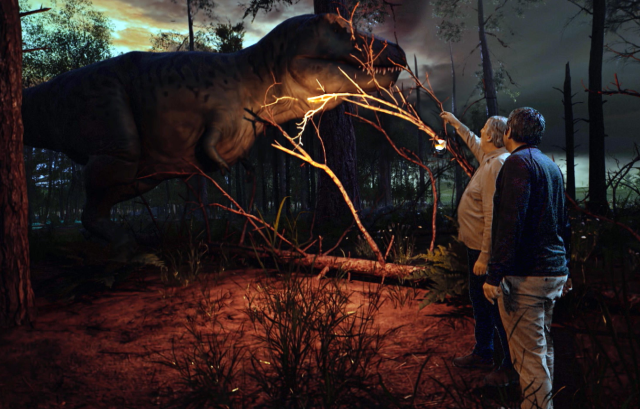Q&A with Dr David Hone: ‘Dinosaurs are a great gateway into science’
Dr David Hone will appear on Dinosaur with Stephen Fry airing this Sunday 26th February on Channel Five. In this Q&A we find out more about the programme and David's career to date.

How long have you been part of Queen Mary?
I have been at Queen Mary for over a decade now. I started as a Lecturer, then a Senior Lecturer and now I’m the Deputy Director of Education and a Reader in Zoology. I enjoy teaching a range of modules including Ecology, Evolution, Animal and Plant Diversity, and Savannah Ecology and Conservation which includes a field trip to South Africa with our 3rd years.
Tell us a little bit about Dinosaur with Stephen Fry…
In short, it's a four-part series with expert palaeontologists and CGI dinosaurs. The show does a really good job of explaining the science and evidence behind the dinosaurs’ movements, inviting experts on brains, feet, ecology, and behaviour of dinosaurs.
Who is the show aimed at?
It’s a show that can be enjoyed by the whole family, especially those over the age of ten. There is a false perception that dinosaurs are only for children or that only children are interested in dinosaurs. In my experience, there are lots of adults that are as much or more interested in learning more about dinosaurs and palaeontology in general. Dinosaurs are a great gateway into science and help awaken people's innate curiosity in how our world works and where we fit within it.
What was it like working on the show?
I have worked on shows before but more behind the scenes. For example, consulting so helping with script, inputting on models, and providing background research. Being on screen speaking about research for a substantial period was a bit different - it’s the first time that I am front and centre of something.
How was it interacting with CGI dinosaurs?
Standing in front of a green screen interacting with a CGI dinosaur that isn’t there and you can’t see, was quite tricky. I mainly feature when Stephen lands in the Late Cretaceous period and sets eyes on a Tyrannosaurus rex. He watches it hunting Triceratops, scavenging and even mating, and tests out its immense bite force. I am mainly interested in the behaviour and ecology of dinosaurs and so on the show speak about everything from carnivore prey choice to their hunting and feeding strategies and possible courtship displays.
What is your favorite dinosaur and why?
A little dinosaur from Mongolia called Protoceratops, mainly because of the high number of well-preserved specimens. There are young juveniles through to large adults, large numbers of skulls and even skeletons, and all from a very narrow time and space that make it near enough (in palaeontological terms) a single population. Among other things, I’ve used this to look at the growth and development of the frill and the implications of anatomy being linked to sexual selection and dominance signals.
Were you always interested in dinosaurs as a child?
No, not especially although this is not representative of most people in the field. I would say I was more just animal-obsessed, but dinosaurs were definitely a part of that.
What would you say to people who are wanting to be a palaeontologist or interested in a career in this field?
Read! Also don’t just recite facts, figures, and names of dinosaurs. It’s much more about understanding the theory and how to work out things and why things happen the way they do. Of course, you will require some knowledge but the why and how is much more important!
Lastly why do you think it’s important to study dinosaurs and ultimately what can we learn?
Studying dinosaurs provides a gateway to science and careers within science. It helps us to make unusual connections and patterns, like with any science degree we offer here in the School of Biological and Behavioural Sciences. I often get emails or have conversations with people who were inspired by dinosaurs and are now working in science today. It also helps continue conversations around the environment such as the loss of biodiversity and the extinction of species.
Related items

4 August 2025

